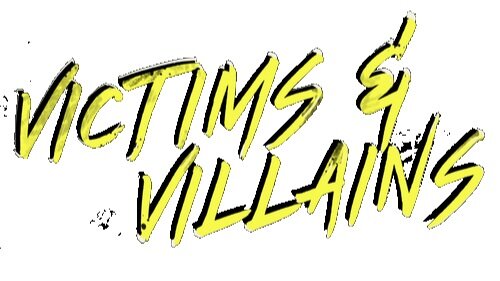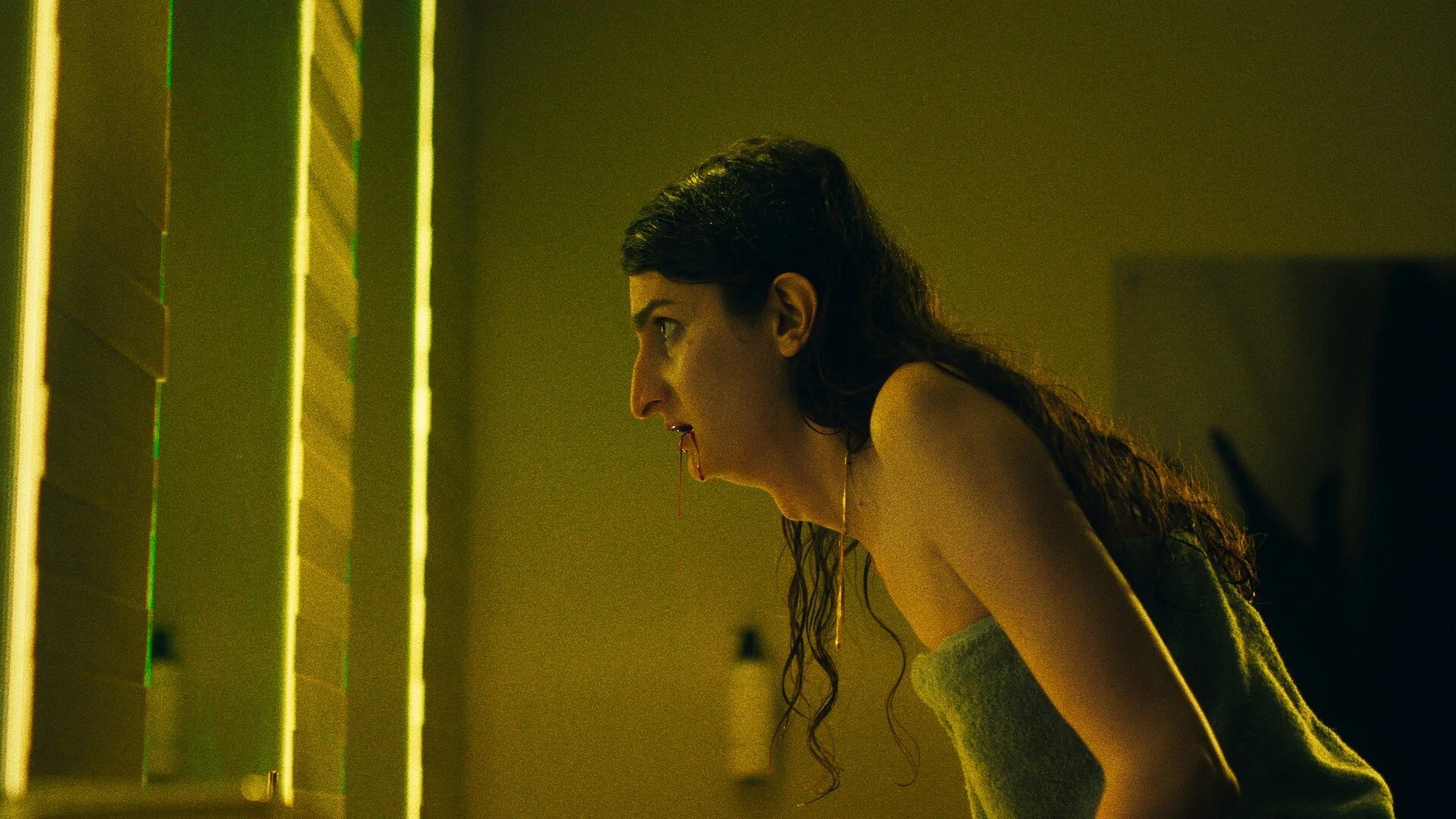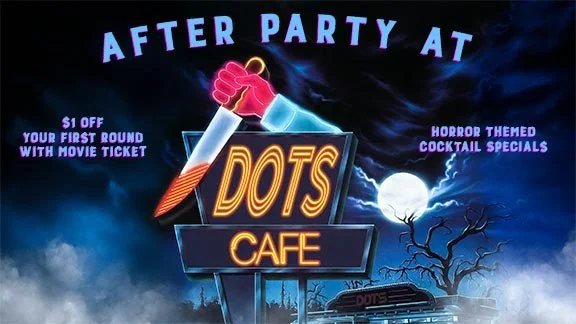Victims and Villains: Queer Screams might be the first film I’ve come across that is an entire showcase of queer filmmakers specifically for the horror genre. Normally in my time working with other festivals, there are certainly LGBTQIA+ filmmakers and films along the line up or we may get a block of films with LGBT themes but it’s rare to see a horror film festival entirely made up of queer filmmakers. Can you tell me about the genesis of the festival?
Queer Screams Film Festival: Interestingly enough, there are actually three in person film festivals in the world that focus solely on Queer Horror: Queer Screams (Portland, OR), Queer Fear Film Festival (Winston-Salem, NC) and Out For Blood (England, UK). Soho Horror has a Pride edition called Sohome Horror, but it’s an online only presentation. From 2010-2022 I ran the NOLA Horror Film Fest in New Orleans, LA. In 2020, NOLAHFF was included in MovieMaker Magazine’s 50 Best Genre Film Festivals list. In the article, MovieMaker specifically noted our focus on LGBTQ+ horror. When I moved to Portland and decided to start a film festival in a city that I actually lived in… LOL!.. I decided to focus on MovieMaker Magazine’s observation and create an LGBTQ+ horror film festival. And being a queer horror filmmaker myself, it was a no brainer. I felt it was important that queer voices – within the horror community – had a platform in which to be heard. And Portland is the perfect city to support such a platform/festival.
V&V: Don Mancini is arguably one of the most recognizable queer icons of the horror genre. He is also one of the only creators who has taken his original creation, in Chucky, and seen him through multiple studios and different versions. Queer Screams is honoring him this year and showing three of the Chucky movies. Which Chucky film is your favorite?
QSFF: To control creative expression of an entire franchise is completely unheard of. It’s truly remarkable. I can’t think of any franchise – horror or not – that has had such a singular voice. Maybe Damien Leone’s “Terrifier” in a few more years. As for my favorite Chucky film, it would have to be Bride of Chucky. It’s the film that introduced us to Tiffany Valentine. What a gift! And I LOVE me some Jennifer Tilly (“Charmed. Charmed.”). Plus, the film was directed by Ronny Yu with great style. I loved Yu’s The Bride with White Hair. I also have a soft spot for Warriors of Virtue. Bride of Chucky is also the first film in the franchise to really lean into the camp.
Photo Courtesy of Universal Pictures
V&V: Don Mancini is your VIP guest this year. That’s pretty freaking awesome. Can you talk about the influence his work has had on your love of the genre?
QSFF: I think the most influential thing about Don (and his work) is his tenacity. Pretty much from the very beginning, he wanted to incorporate LGBTQ+ themes and characters. It’s not until Seed of Chucky, the fifth film in the franchise, that we get a non-binary character. Then we have to wait until the eighth installment of the franchise to get a gay main character. Over 30 years. But that’s what I love about the horror genre. Horror most often embraces transgressive expression (and art). Chucky is definitely transgressive. The horror genre can explore a variety of themes in a cathartic way.
V&V: On top of Mancini’s legendary work being showcased this year - Queer Screams is also showcasing a plethora of independent cinema from all over the world. The festival will be showing 26 selections between shorts and features. What kind of surprises do you have in store for us this year?
QSFF: I think one of the biggest surprises of Queer Screams is just how good the films are. We’ve all been to film festivals (those who frequent film festivals) where the quality is suspect. We’ve all seen that short film in the block and thought, “Wow wow wow. What a stinker. Pee-yew!” And while not every film is at the same level (at Queer Screams) we have always had people coming out of the theater saying, “Wow. That was really great. Those films were all really good.” To which I reply, “I know”. LOL! Because we are such a niche festival, and we don’t get the number of submissions that Sundance or SXSW or Dances With Films gets, one would think that the quality of the presentations would suffer. But oh contraire. One of our primary goals is to gain a reputation of screening excellent, high quality, genre films. So much so that festival goers come for the NEW FILMS as much as they do for the horror classics.
Photo Courtesy of David-Jan Bronsgeest
V&V: The festival has a few short films that are under 5 minutes, which I think is kind of a norm among film festivals. However, the selections this year also include longer selections like Demon Twink (25 minutes), In the Valley (28 minutes), or Binary (42 minutes). Not every festival is going to program longer shorts like these. Why do you think it’s important to provide space for filmmakers to create longer stories like these?
QSFF: I think it’s important because of what you mentioned in the question: not every festival is going to program longer shorts. So these filmmakers, these stories, have less opportunities to find a festival audience than a 5 minute short. But you can’t tell a story like Binary – a film that delves into the intricate and multifaceted experiences of a trans woman, intertwining elements of body horror to explore themes of identity – in 5 minutes. You just can’t. Every festival programmer has to ask this question, “Do I program this one great 30 minute film or these three great 10 minute films?” More often than not it’s going to be the three. But Queer Screams wants to be a festival that will take a chance on a 30 minute film (over three 10 minute films) and present longer narratives. It’s like these longer short films are the festival circuit underdogs. And we love rooting for the underdogs.
V&V: One of the things I find so cool about Queer Screams is that they also do multiple events outside of the actual festival itself. Can you tell us about those?
QSFF: I believe that a film festival MUST do multiple events outside of the actual festival itself. You can’t do one weekend a year and expect people to remember it, let alone flock to it. You have to keep the brand alive throughout the year. That’s why Queer Screams hosts bi-quarterly screenings at the Clinton Street Theater, usually featuring drag performances or a special guest. We have a presence at Portland Pride. We have been a featured partner with Ghosts of Summer (a Halloween festival & market). Queer Screams is actively working to get more involved in the community – both the horror and the LGBTQ+ community.
V&V: There is almost an immersive feel to Queer Screams. Not only are you guys doing an after party at Dot’s Cafe but there is also a Burlesque performance that kicks off the festival with a Don Mancini signing. There is a real sense of community here that you envisioned with the festival. Community is incredibly important for one’s mental health. Can you talk about the importance of providing the community aspect alongside a killer lineup of films?
QSFF: Thank you for noticing the immersive feel and sense of community of Queer Screams. It has been one of our main focuses since day one. Without local business (Clinton Street Theater, Dots Café, etc.) and artist (Drag, Burlesque, Musical, etc.) contributions the event could have been just a random series of film screenings and not a FESTIVAL. A “festival” by its very definition is: An event celebrated by a community and centering on some characteristic aspect or aspects of that community. To take it a step further, for me, a festival equals engagement. There are still so many within the LGBTQ+ community who feel alone and isolated. And festivals, like Queer Screams, provide a safe space for those individuals to come together, to meet one another, and "Let their freak flags fly" (expressing their true, unique selves, even if it's unconventional or perceived as strange by others).
Photo Courtesy of Queer Screams Film Festival
V&V: In your “LGBTA+ Horror” section on your website, you both talk about how growing up queer you are made to feel like an abomination. Something that no doubt has an effect on your mental health. Can you offer any tips or speak any words of wisdom to those who may feel like their sexuality still makes them feel like an abomination?
QSFF: I wish I could say that “It gets better” was still as encouraging as it was when Dan Savage and Terry Miller started the “It Gets Better Project” in 2010. But in this current political climate, when the LGBTQ+ (especially the T) community is being targeted, it’s difficult to say, “It gets better”. I hope it will get better. I hope that when we fight through these dark times that we will emerge into an amazing new and bright age of enlightenment. In the meantime, we need to band together. We need to unite. We need to find our communities. We need to surround ourselves with the people who will say, “You are not an abomination. You are like me. And I’m not an abomination.” My words of wisdom are to use events like Queer Screams to meet likeminded individuals and to form bonds.
V&V: The website also talks about the therapeutic power of film, the horror genre in particular. I’m curious if there is a film, within the genre, that stands out to you as particularly therapeutic.
QSFF: Hmmm. Perhaps Halloween (1978). That film is often credited for solidifying the "final girl" trope. Queer audiences can identify with Laurie Strode because she is the “misfit” – or the “different one” – of her friend group. Also, Laurie doesn't just passively survive; she fights back. I also think that The Craft (1996) is pretty therapeutic. It stands out for its feminist themes and its exploration of the struggles of outsiders. The power of the message can be summed up when Nancy responds to the bus driver with the infamous line, “We are the weirdos, mister.”
V&V: What is the one thing you hope attendees, and even filmmakers, get out of Queer Screams Film Festival this year?
QSFF: In the words of filmmaker Sara Werner, “This weekend was everything our hearts needed to grow and be inspired. It was wonderful to get to enjoy these magical movies, performances and Q&As with the audiences we make art for. To be surrounded by such amazing souls and art all weekend was just purely empowering.” I hope that attendees and filmmakers will be INSPIRED and EMPOWERED.
If you or someone you know is reading this right now and struggling with suicide, depression, addiction, or self-harm - please reach out. Comment, message, or tweet at us. Go to victimsandvillains.net/hope for more resources. Call the suicide lifeline at 988. Text "HELP" to 741-741. There is hope & you DO have so much value and worth!
Victims and Villains is written (and produced) by Josh "Captain Nostalgia" Burkey and others. Music by Mallory Johnson and others. We do not own nor claim any rights.
You can now support us on Patreon. Help us get mental health resources into schools and get exclusive content at the same time. Click here to join today!



